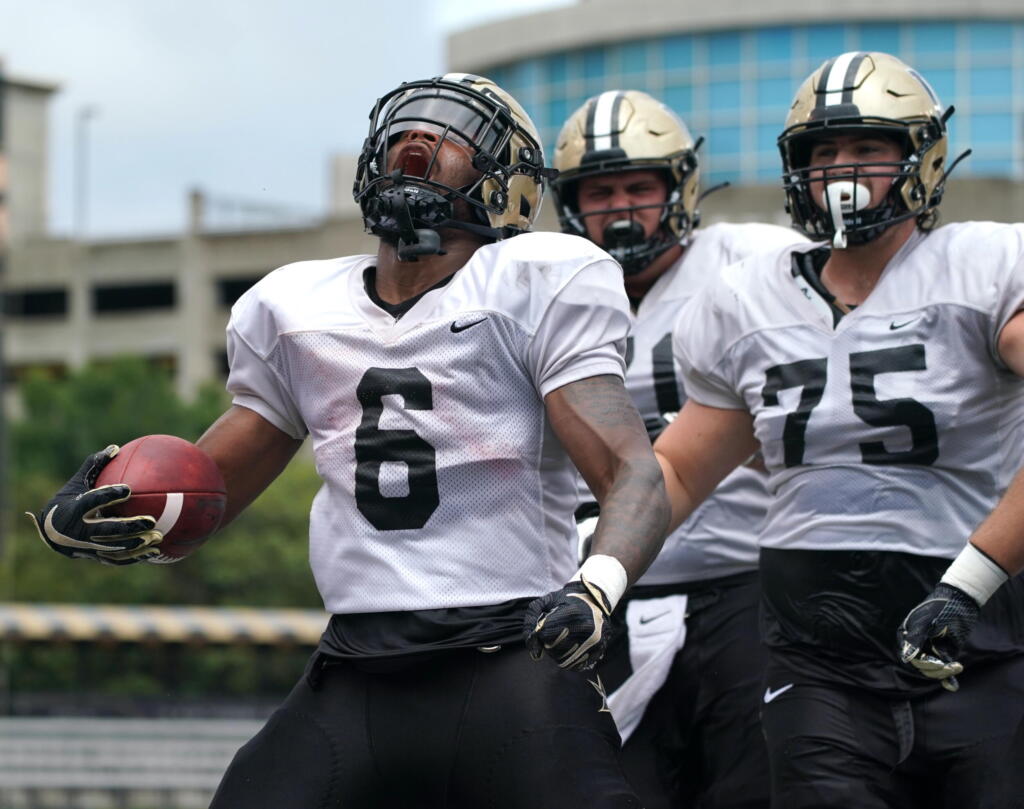Ray of Hope
by Chad BishopVanderbilt junior Re'Mahn Davis, once homeless, begins the 2021 season as the Commodores' starting running back
NASHVILLE, Tenn. — Football is a game of numbers. Statistics tell much of the story before, during and after a game.
There are statistics in the game of life as well. Those statistics say that Re’Mahn Davis should not be here.
“I know how it feels to be that kid on the outside looking in, to not be wanted, to not be with your real family, to have others look out for you and to live that double life where you go to school every day and act like things are normal but when you get home it’s back to reality,” he said. “Those were rough times for me.”
Davis, who will make his Vanderbilt debut when the Commodores play East Tennessee State at 7 p.m. Saturday at Vanderbilt Stadium, has a remarkable – somewhat unbelievable – story to tell about his journey from the streets of San Francisco to the west side of Nashville. And it is a journey that is far from over.
A Kid Without a Home
Davis’ youth was spent in and around the Hayes Valley neighborhood of San Francisco. It was a childhood not too dissimilar from those of his peers.
He played any and every sport that was available to him. He was surrounded by extended family. He was familiar with members of the community, and they with him.
But Davis also was aware at a young age that life would not be easy. His father and mother were both in and out of incarceration. He and his siblings bounced from the homes and residences of family members and acquaintances. By the time he was 8, he was part of California’s foster care system.
There was even a time when a godmother agreed to take two of Davis’ siblings under her wing—but not Davis, because of a strained relationship with Davis’ father. Davis found himself in a shelter where he vividly remembers the realization that he had nowhere to go.
He was homeless.
“I don’t think I’d be the man I am today without those experiences. It just made me look at the bigger picture of life,” Davis said. “There’s always a lot of people going through way worse things than me.”
Davis’ homelessness didn’t last too long—a high school teacher and his wife offered shelter at their apartment for a bit until Davis moved back in with a grandmother. But reminiscent of The Cider House Rules, Davis knew—and was told as much—that the older he got, the lesser the chances would become that a family would be willing to adopt him.
Then came the summer of 2016 and a five-hour car ride.
Banking on Davis’ Future
Lora Banks has four kids of her own. Well, five now.
She and Davis each recalled their first meeting. Banks’ son Bradley and Davis happened to be on the same youth basketball team playing in an event in Santa Barbara. When it was over, Davis cautiously asked if he could bum a ride back to the Bay Area.
Banks agreed — on one condition.

“Bradley said, ‘She’ll give you a ride, but she’ll ask you 1,000 questions,’ ” Banks said. “So that’s where we started. He put on headphones, and I asked questions for about 300 miles.”
What Banks learned was that there was much to learn — and much that Davis wasn’t quite ready to reveal. What high school was he planning on going to that fall, Lincoln High School or St. Ignatius Prep? Why was no one at the basketball tournament to give him a ride home? How were his grades in school? What did he want to do with his life?
In the days that followed, Davis began to show up at the Banks household around dinner time. He just “happened to be in the neighborhood.”
“I never thought to ask a kid who do you live with? Or who feeds you?” Banks said. “He didn’t live anywhere and he didn’t have a quarter in his pocket and he got his meals at school.
“We were absolutely just horrified to know that this child was in our community and nobody knew. It’s still horrifying to me today.”
As Banks and her husband, Greg Ley, continued to try to solve the mystery of Davis’ personal life during the summer of 2016, Davis was invited to join his basketball team on a trip to Reno, Nevada, for a tournament. There was one minor issue, however: Davis was not permitted to cross state lines.
Banks found herself filling out paperwork, pressing fingers into an ink pad and cooperating with social workers to become a temporary guardian for Davis through the month of July. The challenges that arose by the end of that month could have given Banks an outlet to give up the fight for Davis’ well-being.
She didn’t.
New York, New York
Banks happened to be studying law that fateful month. Her education came at the most crucial time in Davis’ young history.
The state had suggested a new foster home for Davis — one in a bordering county, one that while perhaps providing more of an independent and adult lifestyle may have also exposed Davis to more dangers of the city, Banks said.
She found a loophole that allowed her to become the educational rights holder for Davis and to have an important stake in his future.
“I didn’t say, ‘Hey come live with me, be like us, be a part of a nice little family.’ That’s one of the things he didn’t want,” Banks said. “We’re not here to fix you. There’s nothing wrong. We’re here to fix the system.”
Davis had always been highly competitive at sports. He played anything that was available, mostly because he found the games and practices an escape from reality.
Because of his natural gifts, a family friend suggested the young athlete consider boarding school, specifically Trinity-Pawling in Pawling, New York. Former Stanford star and NFL linebacker Shayne Skov graduated from the school and even connected with Davis about the opportunity in front of him.
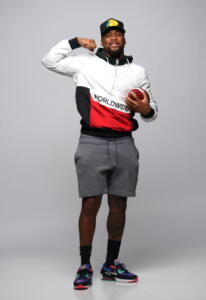
Banks accompanied Davis to New York for an on-site interview with the dean of students at Trinity-Pawling. Davis was accepted on the spot.
Big Ray and Lil Ray
Davis knew all about his father’s athletic stardom from a young age. Mostly because his dad would let everyone know about it.
“Like I tell him, I’m the best in the family, but he’s getting there,” Raymond Davis said, not joking in the slightest.
Raymond Davis was a star at Galileo High School in San Francisco. He excelled in football, basketball, baseball and track, was inducted into the Galileo Sports Hall of Fame in 2019 and has his name in the record books ahead of O.J. Simpson for most touchdowns in a single season for Galileo.
Raymond, profiled for his athletic prowess in a 1998 article by the San Francisco Gate, spent a brief time on the football team at San Jose State before playing for College of Marin. He sees a lot of himself in his son who was known in the neighborhood as Lil Ray.
“Re’Mahn has that vision. He sleeps and eats football. That’s something that I did. He studies the game,” Raymond Davis said. “That’s one thing that Re’Mahn does is he studies the game, and he pays attention. He asks a lot of questions.
“That’s one thing I always tell him is to ask a lot of questions because you always want to know, if the B-gap is closed where else can you go? If the C-gap is closed where else can you go?”
Raymond Davis had started the road to rehabilitating his own life by the time Banks and Re’Mahn Davis settled on the decision for Re’Mahn to move from one side of the country to the other. Raymond was awarded custody of 16-year-old Re’Mahn in order to allow his son to move to New York.
That particular moment was the conclusion of an intense battle over what the future held for Re’Mahn Davis, a kid on the streets who now had been presented a golden ticket.
“There were a lot of naysayers,” Banks said. “Some of his family opposed (the move to New York), the social workers opposed it, the district attorney for the state opposed it. We had to go to court to get permission from the state to move him out of state to go to school in New York. The judge looked at Re’Mahn and said, ‘What do you want to do?’
“He said, ‘I want to go to school, I want to get an education, I want to play football. If I can’t play football, I want to go to college and I want to be a lawyer.’ She said, ‘I’m going to do something that I don’t get many chances to do. In fact, I don’t think I’ve ever done it before. You are no longer a ward of the court.’ She took out this little teddy bear and threw it to Ray, and he caught it. Then she said, tears rolling down her face, ‘You’re going to boarding school, and I believe you’re going to college.’ ”
From Trinity to Temple to Vanderbilt
Davis admits he never dreamed of playing college football. Heck, in middle school he never knew he could even play high school football.
But after rushing for 462 yards and five touchdowns for Trinity-Pauley in 2017, he began to get recruitment letters in the mail from the likes of Syracuse and Boston College as his grades improved and his highlight reel popped. Needing a post-graduate year to improve his academic standing, Davis enrolled at Blair Academy in New Jersey where he totaled 1,698 rushing yards and scored 35 touchdowns in eight games as a quarterback on offense and cornerback on defense.
Davis had hoped to go to Purdue, he said, but his recruitment there fell through. He grew a strong relationship with a prior coaching staff at Temple and decided to go to Philadelphia. He became a star with the Owls after a slow start.
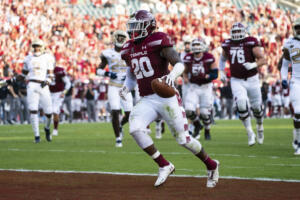
“I was out all spring, so I didn’t get to practice and didn’t get to do a lot of things. Summer came, and the first day of summer I was the seventh back on the depth chart,” Davis said. “By the third day I was the first. I really dug deep in the playbook, used to constantly go to meetings with our running backs coach and just told them, ‘You got to give me a chance.’ Once I got the reps I just took off from there.
“The (East Carolina) game is when it finally set in what was happening. My teacher actually brought it up in class.”
After rushing for 936 yards and eight touchdowns in 2019 for Temple, Davis added 323 yards in four games during the shortened 2020 season. Despite that success, Davis yearned for a better fit for himself, academically and athletically.
He connected with former Vandy offensive line coach Pete Rossomando after Davis officially announced his intention to transfer. He enrolled at Vanderbilt in January — an unlikely stop on a path full of innumerable obstacles and sobering moments.
“When I took him to Trinity-Pauling, he had his own dorm room by himself,” Banks said. “We went to the grocery store, and we got his (drinks) and his toothpaste and his new sheets and his comforter. He stood and looked all big-eyed and said, ‘I’ve never had one of these. I’ve never had a bed.’ ”
What Drives Davis
On Saturday, Davis, 21, will start at running back for the Commodores.
Yes, he’s the oldest running back on the team. And yes, Vandy isn’t deep in numbers at the position. But that doesn’t diminish that Davis (5-9, 205) won the starting job by virtue of his work on and off the field during the past eight months.
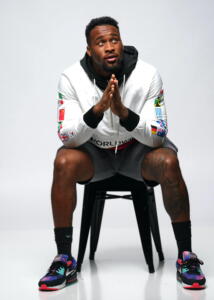
“He’s taken a leadership role in that room which has been phenomenal,” Vanderbilt running backs coach Norval McKenzie said. “That started this summer with getting the guys together and watching extra film, going over quizzes with them and things of that nature. He’s the heartbeat of that room right now.”
Majoring in communication studies with hopes of going into sports broadcasting in the future, Davis also has the fortune of walking across the street from campus to an apartment now inhabited by Banks and Ley. The couple moved to Nashville over the summer to watch Davis play for the Commodores.
They’ll be at Vanderbilt Stadium on Saturday.
“He’s just such a good kid. Not good like right and wrong, but he’s got a heart and he’s very savvy about what he’s dealing with and marshaling his resources,” Banks said. “He didn’t choose his situation but somehow—we always talk about on the field how he was made for it his whole life: ‘Hey, this isn’t working, I need to go the other way. I need an escape route. Who cares if they said the hole was going to be open? It’s not, so let’s run the other way.’
“He never got hurt. He never got involved in crime. He was never around the wrong people. He never badmouthed his family. People had done him wrong — he moved on. He’s just solid. Live, learn, move on.”
Raymond Davis is now in management at Best Beverage Co. in San Francisco, a company that caters some of the region’s biggest entertainment events. He has already visited his son on campus and plans to be in attendance for games this fall.
“At the end of the day, Ray’s been through so much. He’s been through a lot. He made it,” Raymond said. “Where we come from, in our neighborhood, the inner-city kids usually don’t make it out. Re’Mahn made it out. I’m just so, so proud of him.
“He acts just like me. He plays like me. He does everything like me. I’m just so happy.”
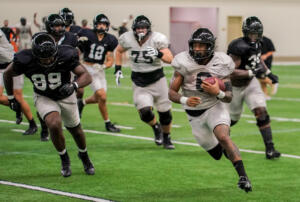
Re’Mahn Davis claims 10 siblings — some of whom he didn’t meet until he was a teenager — and is closest to his younger sisters Jashonna and Janiyah. He also has a newfound brotherhood inside the locker room at McGugin and a growing family at Vanderbilt of those support him.
At the end of the 2021 season, Davis hopes to look up and impress that family with his first season in the Southeastern Conference. He also hopes someone sees his success for what it really is.
“I don’t really do it for me. I do it for all the other kids who are in the system,” he said. “They don’t have a voice. I didn’t have a voice when I was a kid. I didn’t have anyone that believed in me. Didn’t have anyone tell me, ‘You’re going to go to college and play football.’
“For me to be able to have a voice and look at a kid who is going through the same thing I went through, who is in the foster care system, who may or may not be getting adopted or taken up, to look at them and tell them, ‘There’s a chance, you can make it, you’re going to go through a lot of obstacles. Nothing was easy for me. I had to go through so many obstacles. But at the end of the day if you know there’s going to be a light at the end of the tunnel, then keep pushing. Keep fighting, no matter what.’
“That’s the biggest thing for me. If I do make it, I hope to be a success story, not for me or my family, but for those kids and the less fortunate.”
— Chad Bishop covers Vanderbilt for VUCommodores.com.
Follow him @MrChadBishop.
